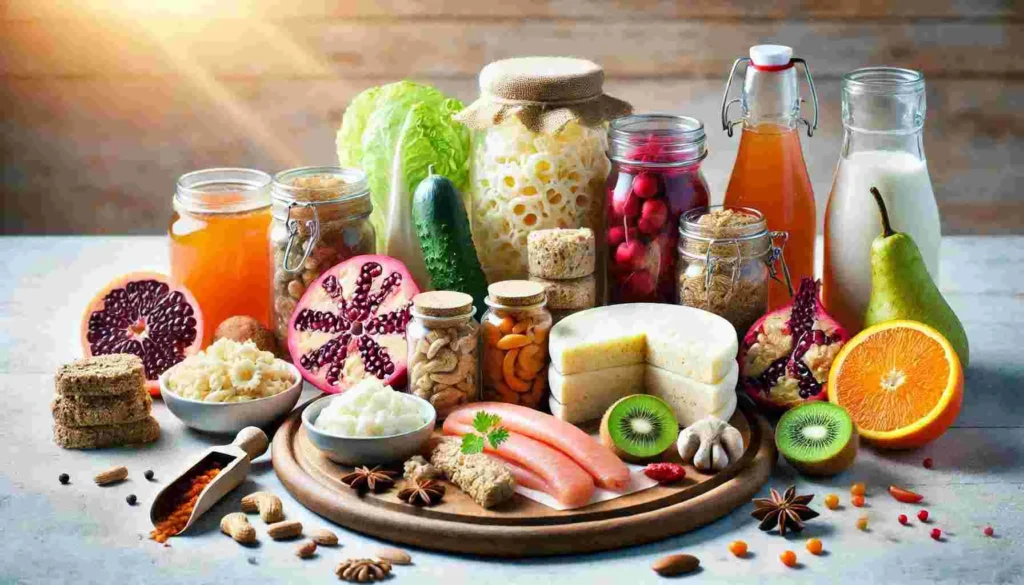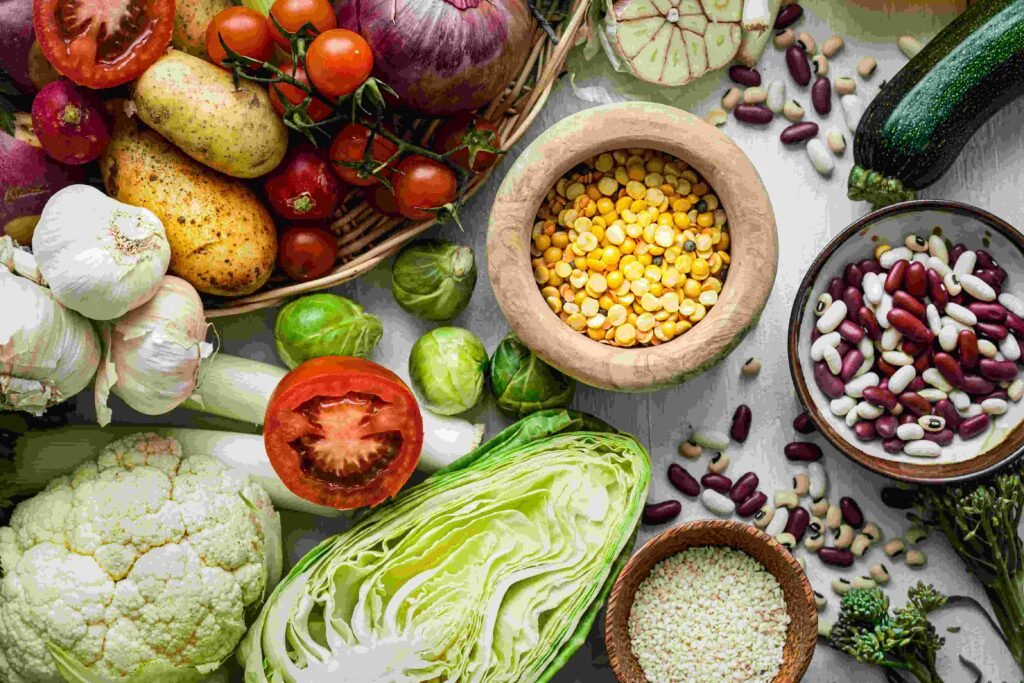
The Role of Fermented Foods in Gut Health
Introduction to Fermented Foods and Gut Health
Fermented foods have gained immense popularity in recent years, not just as flavorful additions to meals but as key components for improving gut health. With an increasing focus on holistic well-being, the role of the gut in overall health cannot be overstated. The gut, often referred to as the “second brain,” influences digestion, immunity, mental health, and more. Incorporating fermented foods into your diet is one of the simplest and most effective ways to support gut health naturally.
Understanding Fermented Foods
Fermentation is a process that uses microorganisms like bacteria and yeast to break down food components, such as sugars and starches, into simpler compounds. This process not only enhances the flavor and texture of food but also increases its nutritional value. Popular fermented foods include yogurt, kefir, sauerkraut, kimchi, miso, tempeh, and kombucha.
The key feature of fermented foods is the presence of live probiotics—beneficial bacteria that help balance the gut microbiome. A healthy gut microbiome is essential for maintaining digestion, absorbing nutrients, and protecting the body from harmful pathogens.
Why Gut Health Matters
The gut is home to trillions of microorganisms, collectively known as the gut microbiota. These microorganisms play a critical role in maintaining bodily functions, including:
- Digestive Health: Gut bacteria help break down complex food molecules and aid in the production of essential nutrients like B vitamins and vitamin K.
- Immune System Support: About 70% of the immune system resides in the gut. A balanced gut microbiome helps the body defend against infections and diseases.
- Mental Health Connection: The gut-brain axis links the gut and brain, impacting mood, stress levels, and mental clarity. A well-balanced gut can help reduce anxiety and depression.
- Weight Management: A healthy gut microbiome can influence metabolism and reduce inflammation, aiding in weight regulation.
The Science Behind Fermented Foods and Gut Health
Fermented foods are packed with probiotics, which are live microorganisms that provide health benefits when consumed in adequate amounts. Probiotics enhance gut health by:
- Restoring Balance: Modern diets, stress, and antibiotics can disrupt the gut microbiome. Probiotics from fermented foods help restore balance by replenishing beneficial bacteria.
- Reducing Inflammation: Certain strains of probiotics reduce gut inflammation, which is linked to conditions like irritable bowel syndrome (IBS) and inflammatory bowel disease (IBD).
- Enhancing Nutrient Absorption: Probiotics improve the gut’s ability to absorb essential nutrients like calcium, magnesium, and iron.
- Boosting Immune Response: Regular consumption of probiotics strengthens the gut barrier and promotes a robust immune response.
Top Fermented Foods for Gut Health
Including a variety of fermented foods in your diet can provide a diverse range of probiotics. Here are some of the best options:
- Yogurt: Rich in live cultures like Lactobacillus and Bifidobacterium, yogurt is one of the most accessible fermented foods. Look for plain, unsweetened options for maximum benefit.
- Kefir: A fermented milk drink similar to yogurt but with a thinner consistency and more potent probiotic content.
- Sauerkraut: Fermented cabbage loaded with fiber, vitamins, and probiotics. Choose unpasteurized varieties to ensure live cultures are intact.
- Kimchi: A spicy Korean dish made from fermented vegetables, including cabbage and radishes, seasoned with spices.
- Tempeh: A fermented soy product that’s an excellent source of plant-based protein and probiotics.
- Miso: A traditional Japanese seasoning made from fermented soybeans, offering a savory flavor and gut-friendly benefits.
- Kombucha: A fizzy, slightly tangy tea fermented with a symbiotic culture of bacteria and yeast (SCOBY).
How to Incorporate Fermented Foods into Your Diet
Adding fermented foods to your meals can be both simple and delicious. Start small to allow your gut to adapt to the new probiotics. For example:
- Breakfast: Add a dollop of yogurt or kefir to your morning smoothie or oatmeal.
- Lunch: Top your salad or sandwich with sauerkraut or kimchi for a tangy twist.
- Dinner: Use miso as a base for soups or marinades, or enjoy tempeh as a meat alternative.
- Snacks: Sip on kombucha or munch on pickles made with natural fermentation.
Long-Term Benefits of Fermented Foods for Gut Health
Incorporating fermented foods into your diet offers not just immediate digestive relief but also long-term health benefits. Here are some of the key advantages:
- Enhanced Digestive Function:
Regular consumption of fermented foods helps maintain a balanced gut microbiome. Over time, this balance leads to improved digestion, reduced bloating, and better nutrient absorption. Conditions like constipation and diarrhea may also be alleviated with a healthy intake of probiotics. - Stronger Immune System:
The gut is central to the immune system, housing a significant portion of immune cells. Probiotics in fermented foods enhance the gut barrier, preventing harmful pathogens from entering the bloodstream. This not only reduces the risk of infections but also lowers susceptibility to chronic illnesses. - Improved Mental Well-Being:
A healthy gut directly impacts the brain through the gut-brain axis. Regular intake of probiotic-rich fermented foods has been linked to reduced levels of anxiety, depression, and stress. Over time, you may notice an improvement in mental clarity and emotional resilience. - Chronic Disease Prevention:
Long-term consumption of fermented foods may reduce the risk of chronic conditions such as type 2 diabetes, cardiovascular disease, and obesity. The anti-inflammatory properties of probiotics and their ability to regulate blood sugar levels contribute significantly to these benefits. - Support for Healthy Aging:
As we age, the diversity of gut bacteria tends to decrease. Fermented foods can replenish beneficial bacteria, promoting longevity, better digestion, and improved energy levels in older adults.
How to Choose the Right Fermented Foods for Your Gut
Not all fermented foods are created equal. To reap the maximum benefits, consider the following factors when selecting products:
- Look for Live and Active Cultures:
Check product labels for phrases like “live and active cultures” or “contains probiotics.” Avoid pasteurized varieties, as the heat from pasteurization often kills beneficial bacteria. - Prioritize Organic Options:
Organic fermented foods are free from harmful pesticides and chemicals, making them a healthier choice for gut health. Look for certified organic labels whenever possible. - Avoid Added Sugars:
Many commercial fermented foods, like flavored yogurts or sweetened kombucha, contain added sugars that can counteract the benefits of probiotics. Opt for plain or low-sugar versions instead. - Diversify Your Choices:
Different fermented foods contain different strains of probiotics. Incorporating a variety of options—such as yogurt, kimchi, and tempeh—ensures your gut microbiome receives a broad spectrum of beneficial bacteria. - Start with Small Portions:
If you’re new to fermented foods, introduce them gradually into your diet. Sudden consumption of large amounts can lead to temporary digestive discomfort as your gut adjusts.
Potential Challenges and Misconceptions About Fermented Foods
While fermented foods offer numerous benefits, some misconceptions and challenges can arise. Here’s what you need to know:
- Probiotics Are Not a Cure-All:
While fermented foods are beneficial, they are not a standalone solution for all gut-related issues. A healthy diet, regular exercise, and stress management are also essential for optimal gut health. - Individual Sensitivities:
Some people may experience bloating or gas when first incorporating fermented foods into their diets. These symptoms are usually temporary but can be avoided by starting with small portions. - Salt Content in Fermented Foods:
Products like sauerkraut and kimchi can be high in sodium due to the fermentation process. Those with high blood pressure should consume these foods in moderation or opt for low-sodium varieties. - Not All Fermented Foods Contain Probiotics:
Foods like beer, wine, and certain pickles undergo fermentation but may not contain live probiotics due to processing or pasteurization. Always read labels carefully to ensure you’re consuming products with active cultures. - Home Fermentation Requires Care:
Making fermented foods at home can be cost-effective, but it requires attention to hygiene and proper techniques. Improper fermentation can lead to contamination and spoilage, which may cause harm if consumed.
Tips for Incorporating Fermented Foods into Your Lifestyle
To make fermented foods a sustainable part of your daily routine, follow these practical tips:
- Plan Balanced Meals:
Pair fermented foods with a balanced diet rich in fruits, vegetables, lean proteins, and whole grains. This ensures your gut bacteria have the nutrients needed to thrive. - Experiment with Recipes:
Fermented foods can add flavor and texture to meals. Experiment with recipes like kimchi fried rice, yogurt-based smoothies, or tempeh stir-fries to keep your meals interesting. - Opt for Snacks:
Fermented foods like pickles, miso soup, or a glass of kombucha make excellent snacks. They’re quick, nutritious, and easy to incorporate into busy schedules. - Educate Yourself:
Learn about the different types of probiotics and how they impact the gut. This knowledge will help you choose fermented foods that cater to your specific health goals. - Stay Consistent:
Consistency is key to reaping the long-term benefits of fermented foods. Aim to include at least one serving daily in your diet for noticeable improvements in gut health.
DIY Fermentation: Making Your Own Gut-Friendly Foods
Making fermented foods at home is a rewarding way to take control of your gut health. With simple ingredients and basic equipment, you can prepare your own probiotic-rich dishes. Here’s how to get started:
- Basic Equipment for Fermentation:
You’ll need sterilized jars, clean utensils, and weights (to keep ingredients submerged). A dark, cool spot for fermentation is also essential. - Popular DIY Fermented Foods:
- Sauerkraut: Shred fresh cabbage, add salt, and pack it tightly into a jar. Ensure the cabbage is submerged in its juices and let it ferment for 1-4 weeks.
- Kimchi: Combine napa cabbage, radishes, garlic, ginger, chili paste, and salt. Ferment in a jar for 1-3 weeks.
- Kombucha: Brew sweet tea, add a SCOBY (symbiotic culture of bacteria and yeast), and ferment for 7-10 days.
- Yogurt: Heat milk, cool it down, and add a yogurt starter. Let it ferment in a warm spot for 8-12 hours.
- Safety Tips for Home Fermentation:
- Always use clean, sterilized equipment to avoid contamination.
- Ensure food is fully submerged in brine to prevent mold.
- Trust your senses—if a fermented product smells foul or looks off, discard it.
Addressing Common Myths About Fermented Foods
Despite their popularity, fermented foods are often misunderstood. Let’s dispel some common myths:
- Myth: All Fermented Foods Contain Probiotics
- Fact: Not all fermented foods have live probiotics. Products like pasteurized sauerkraut or beer lose beneficial bacteria during processing.
- Myth: Fermented Foods Are All High in Salt
- Fact: While some are salt-rich, low-sodium versions or careful home preparation can reduce salt levels without compromising quality.
- Myth: Fermented Foods Are Only for Gut Health
- Fact: Fermented foods benefit the entire body, including improved immunity, reduced inflammation, and enhanced nutrient absorption.
- Myth: Fermented Foods Taste Bad
- Fact: Fermentation enhances flavor, offering tangy, savory, and umami profiles that can elevate meals.
- Myth: You Need to Eat Large Quantities
- Fact: Small, consistent servings are more effective than overeating. A few spoonfuls daily are sufficient for most people.
How Fermented Foods Fit Into Modern Dietary Practices
Fermented foods complement a variety of dietary preferences, making them versatile additions to modern lifestyles:
- For Vegan Diets:
- Fermented options like tempeh, miso, and kombucha provide essential probiotics and nutrients often lacking in plant-based diets.
- For Low-Carb Diets:
- Fermented vegetables like sauerkraut and kimchi are low in carbs but rich in flavor and probiotics, making them ideal for keto enthusiasts.
- For Gluten-Free Diets:
- Naturally fermented gluten-free foods, such as yogurt and coconut kefir, can support gut health without triggering sensitivities.
- For Weight Loss Plans:
- Fermented foods improve digestion and may curb cravings by promoting a balanced gut microbiome, supporting sustainable weight loss.
The Science-Backed Benefits of Fermented Foods in Modern Health
Scientific research continues to reveal the profound effects of fermented foods on overall health. Here’s a look at the latest findings:
- Improved Metabolic Health:
Studies suggest that probiotics from fermented foods can reduce insulin resistance and support better blood sugar control, benefiting those with metabolic disorders. - Enhanced Mental Health:
Fermented foods containing Lactobacillus and Bifidobacterium have been shown to reduce anxiety and depression by modulating the gut-brain axis. - Reduced Inflammation:
Probiotics help lower systemic inflammation, which is linked to chronic conditions such as arthritis, cardiovascular disease, and autoimmune disorders. - Cancer Prevention:
Certain compounds produced during fermentation, like butyrate, have shown potential in reducing the risk of colon cancer.
Creating a Sustainable Gut-Health Routine
To make fermented foods a consistent part of your lifestyle, consider the following strategies:
- Batch Preparation:
Prepare fermented foods in large quantities to save time. Most fermented products store well for weeks, allowing for easy meal planning. - Pair with Prebiotics:
Combine fermented foods with prebiotic-rich ingredients like garlic, onions, bananas, and asparagus. Prebiotics feed beneficial gut bacteria, enhancing their effectiveness. - Educate Your Family:
Introduce fermented foods to your household and share the benefits with family members. Start with mild flavors like yogurt to encourage acceptance. - Monitor Your Gut Health:
Pay attention to how your body responds to different fermented foods. If you notice improved digestion, energy, and mood, you’re on the right track.
The Future of Fermented Foods in Wellness Trends
As awareness of gut health grows, fermented foods are becoming integral to wellness trends. Innovations in fermentation technology are making these foods more accessible and tailored to individual health needs. Personalized probiotics, enhanced fermentation processes, and fortified fermented foods are expected to lead the next wave of health-focused diets.



